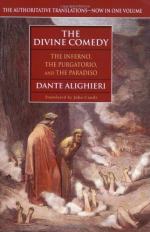“This would’st thou know, if failure of
the vow
By other service may be so supplied,
As from self-question to assure the soul.”
Thus she her words, not heedless of my wish,
Began; and thus, as one who breaks not off
Discourse, continued in her saintly strain.
“Supreme of gifts, which God creating gave
Of his free bounty, sign most evident
Of goodness, and in his account most priz’d,
Was liberty of will, the boon wherewith
All intellectual creatures, and them sole
He hath endow’d. Hence now thou mayst
infer
Of what high worth the vow, which so is fram’d
That when man offers, God well-pleas’d accepts;
For in the compact between God and him,
This treasure, such as I describe it to thee,
He makes the victim, and of his own act.
What compensation therefore may he find?
If that, whereof thou hast oblation made,
By using well thou think’st to consecrate,
Thou would’st of theft do charitable deed.
Thus I resolve thee of the greater point.
“But forasmuch as holy church, herein
Dispensing, seems to contradict the truth
I have discover’d to thee, yet behooves
Thou rest a little longer at the board,
Ere the crude aliment, which thou hast taken,
Digested fitly to nutrition turn.
Open thy mind to what I now unfold,
And give it inward keeping. Knowledge comes
Of learning well retain’d, unfruitful else.
“This sacrifice in essence of two things
Consisteth; one is that, whereof ’t is made,
The covenant the other. For the last,
It ne’er is cancell’d if not kept:
and hence
I spake erewhile so strictly of its force.
For this it was enjoin’d the Israelites,
Though leave were giv’n them, as thou know’st,
to change
The offering, still to offer. Th’ other
part,
The matter and the substance of the vow,
May well be such, to that without offence
It may for other substance be exchang’d.
But at his own discretion none may shift
The burden on his shoulders, unreleas’d
By either key, the yellow and the white.
Nor deem of any change, as less than vain,
If the last bond be not within the new
Included, as the quatre in the six.
No satisfaction therefore can be paid
For what so precious in the balance weighs,
That all in counterpoise must kick the beam.
Take then no vow at random: ta’en, with
faith
Preserve it; yet not bent, as Jephthah once,
Blindly to execute a rash resolve,
Whom better it had suited to exclaim,
‘I have done ill,’ than to redeem his
pledge
By doing worse or, not unlike to him
In folly, that great leader of the Greeks:
Whence, on the alter, Iphigenia mourn’d
Her virgin beauty, and hath since made mourn
Both wise and simple, even all, who hear
Of so fell sacrifice. Be ye more staid,
O Christians, not, like feather, by each wind
Removable: nor think to cleanse ourselves




